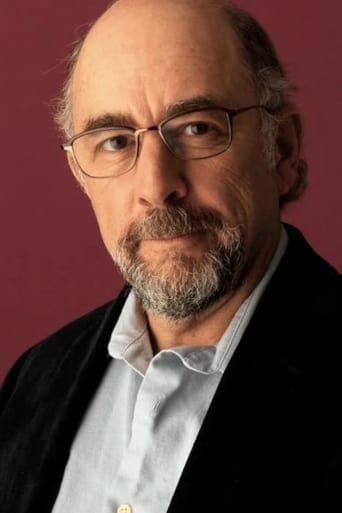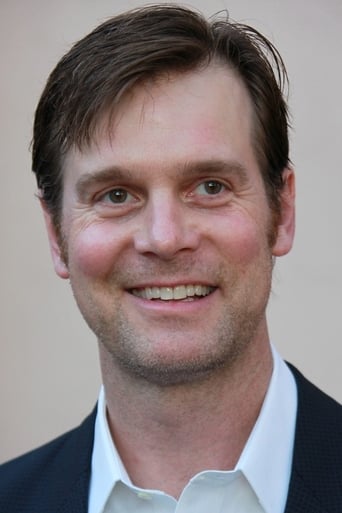Cubussoli
Very very predictable, including the post credit scene !!!
Acensbart
Excellent but underrated film
InformationRap
This is one of the few movies I've ever seen where the whole audience broke into spontaneous, loud applause a third of the way in.
Kaelan Mccaffrey
Like the great film, it's made with a great deal of visible affection both in front of and behind the camera.
ltlacey
We open the movie with our protagonist depositing his severance check at the bank, and when told he could save himself time by using the ATM he gets angry. Later on, when he is at the post office and is told that he could save time by using a machine, he almost loses it, but holds his anger in. From the first incident, and then reinforced by the second, I realized that Terry has a problem with machines, and especially with those who tell him how convenient they are. (Keep in mind the theme of how convenient they are.) This is later brought up with an inference that his job could be done by a machine. We also have small snippets and comments that Terry is not too mentally stable, and we see this as well as the movie progresses. The arrival of a new neighbor, a man of middle-eastern descent, sets the final stages of Terry's tenuous grasp of reality, and the final scenes in the movie, going. The acting was spot on, though at times the camera work was a bit too jumpy, even if it was supposed to relay Terry's world (how unstable it was becoming). IF YOU DO NOT WANT TO KNOW WHAT HAPPENS, STOP READING NOW. I have read numerous threads and blogs about this movie, but to date have not read anything to support the fact that Hassan was, or was not, a terrorist. But I shall leave the readers with this thought: Remember when you were in college (for those who went) and all the books and notebooks you had all over the place? How about those of you who attended graduate school? I've been in academia for ages, and even when I am taking but 1 class, there are reference books, as well as that class' textbook around. In every scene inside Hassan's apartment, and we saw every room and most every closet, I did not see one notebook or one textbook, and I found this odd that a graduate student did not have one single academic anything where he lived. The only thing he had was his laptop, which might work if one was a history major, but not a science (chemical engineer from what I concluded when he was describing to Terry what he was studying). So now, was he truly a terrorist or not? And the final scene of the movie, when Terry was watching the TV (another reason to shut the darn thing off; what with all the Too Much Information Can Be Bad for You going on 24/7) and it's a golf show, was the news snippet real or not? I think it was what he was remembering hearing, as the announcer said this incident with the cyanide on the flaps of the envelopes happened weeks prior. Or how about this? The entire movie, much like Slater in He Was A Quiet Man, is Terry's psychosis remembering events as he knows them, not as they actually occurred. This would explain why the FBI agent did not do anything and the death of his wife from a single shot from his own gun (from far away and small caliber too!). If you have seen this movie, but were not too sure or did not like it, watch it again, but this time pay special attention to Hassan's apartment and what Marla and Agent Hilary say to Terry.
mike70800
Always liked Peter Krause from 'Six Feet Under'. Just had to see this film. We definitely recommend this movie and found it unpredictable. We could feel the frustration of him losing his job while talking to the bank teller. It was never really clear whether or not he was paranoid or justified in suspecting his neighbor. The ending keeps you guessing. At the very end of the film when it appears that Terry is watching a news report on poisoned envelope glue. The reflection in his eye is that of the golf coverage. This implies that he is hallucinating the news. However, there is also a brief reflection of the news in his eyes as well. What does this mean?
Lechuguilla
Peter Krause plays Terry Allen, a laid-off accountant with time on his hands. As he updates his resume he becomes obsessed with the new tenant who has moved into an apartment across the courtyard, a man of Middle Eastern origin, whose behavior seems suspicious to Allen. Of course, Allen is one of these people who never learned that there is nothing more deceptive than superficial appearances.The real basis of Allen's obsession is television "news", which he constantly has on, blaring out scary headlines and hints of "terror". Allen's wife Marla (well played by Kari Matchett) tries to be the voice of reason. But she is no match for the nonstop fear message coming from the boob tube. And the more Allen connects the TV message to the suspicious stranger, the more paranoid and irrational Allen becomes.It's a highly relevant story, one wherein Allen represents many gullible Americans who take at face value everything they hear on TV. In the real world, most people have psychological brakes that prevent them from acting on their fears. Allen does not have those brakes, and he reacts accordingly."Civic Duty" is mostly a visual film; dialogue is fairly minimal. However, some of the lines convey the film's theme. In one confrontation Terry tells Marla: "We all have to be the eyes and ears now (for the FBI)". To which Marla responds: "If you weren't up here all day long spying on our neighbors like some paranoid right-wing whack ..."; Terry retorts: "Just because they're paranoid doesn't mean they're wrong ...".The film's pace in the first half is fine; the plot moves along at a good clip. In the second half, the pace slows, as viewers must endure a tedious police standoff. A chase sequence in the second half is unnecessary filler. The lack of inquisitive neighbors provides the basis for an obvious plot hole, particularly as we approach the film's climax.Cinematography is adequate; the emphasis is on close up shots, even extreme close-ups. Lighting trends toward low level. Overall acting is slightly above average. Richard Schiff, as the low-key, laconic FBI agent, gives an especially good performance. Background music is fairly creepy, and when combined with the dark visuals and minimal dialogue, creates a fair amount of suspense.The real "message" of this film is the dreadful effect that television "news" has on many Americans. In effect, "Civic Duty" is the cinematic expression of media critic Marshall McLuhan's famous line, some forty years ago: "The medium is the message".
Gram
This movie is as good as you'd expect. You get slowly dragged into the world of anti-terrorist paranoia through the eyes of one character that creates a dillusion we can all empaphise with but he takes it to a level we would never pursue as a warning of what can and does happen. This movie cleverly takes you on a journey where you can choose to get off and the shock value is extremely thought provoking. People looking for a happy ending or a solid moral might not come away satisfied but anyone whos enjoys shocking surrealism like 'The Woodsman' will love this movie.8/10.




